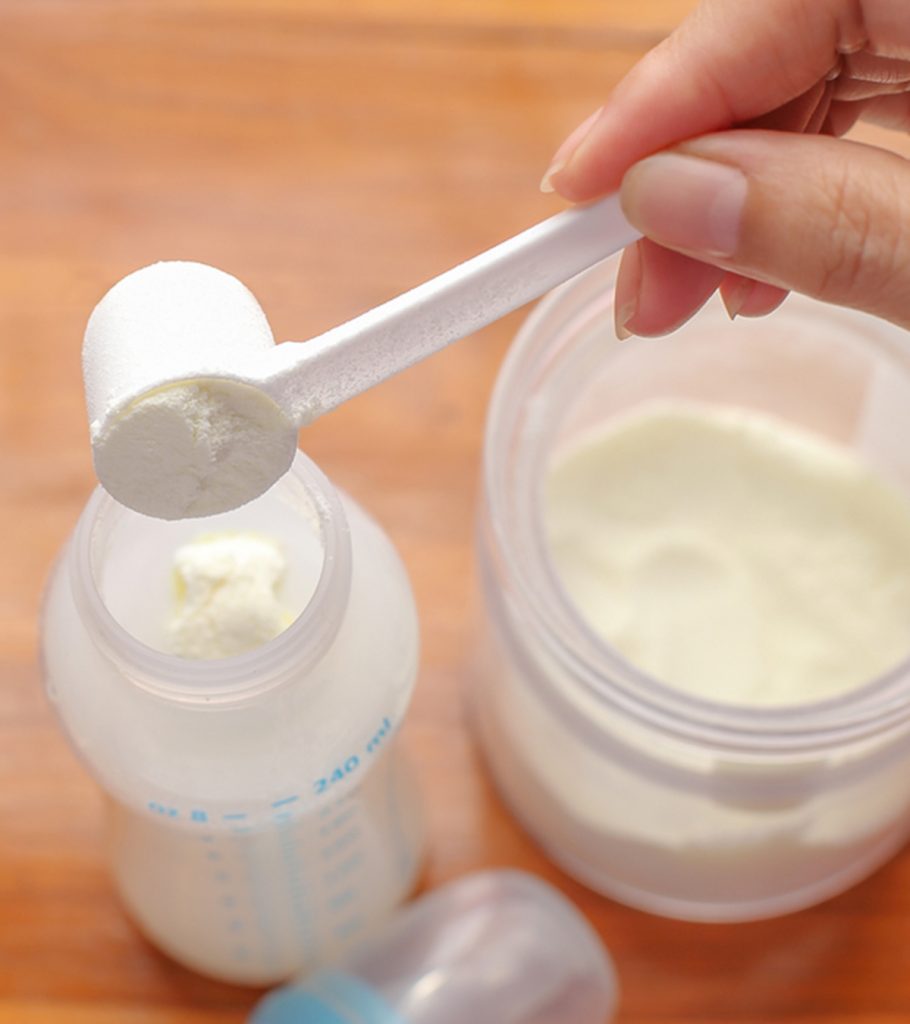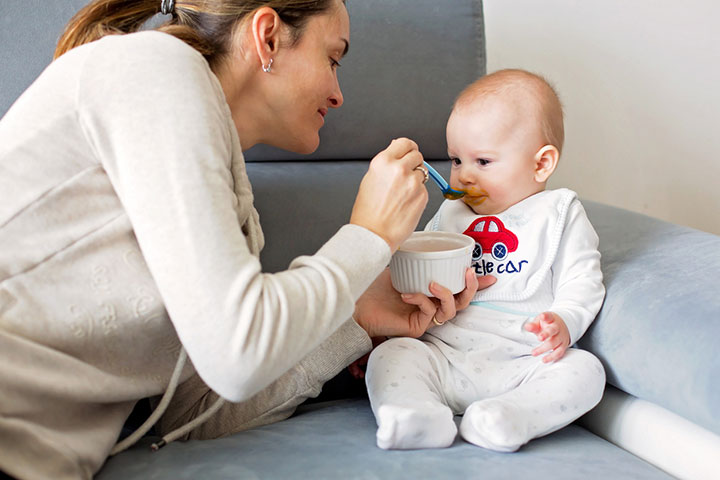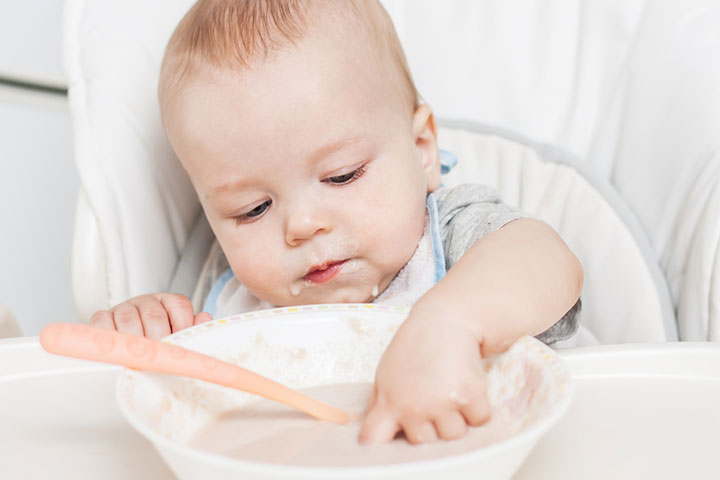Parents are often worried when their babies have sleep interruptions. Several factors might be responsible for this phenomenon, the most important one being hunger. In such times, most parents consider adding rice cereal to the bottle.
Parents opt for rice cereal as baby food because of its numerous benefits. Many also believe that rice cereal thickens the formula and helps keep babies’ stomachs full for longer durations, facilitating a sound sleep. However, there are no research-based studies to support this belief. Moreover, this infant feeding practice has several short and long-term safety concerns.
Learn more about the safety of adding rice cereal to your baby’s bottle, the associated health problems, other alternatives, and more in this post.
Is It Safe To Add Rice Cereal In Baby’s Bottle?
The American Academy of Pediatrics (AAP) discourages adding rice cereal in the bottle unless directed by a pediatrician (1). Experts believe that rice cereal in the bottle is a potential choking hazard, especially for young infants whose oral motor skills are underdeveloped. Besides, their digestive system isn’t capable of digesting solids, and exposing babies to solids early could raise the risk of food allergies. The World Health Organization also recommends cup feeding as opposed to bottle feeding, in an attempt to curb diarrheal diseases that may be caused by germs that harbor on feeding bottles. Hannah Whittaker, a UK-based pediatric and pregnancy dietitian, says, “I would not advise parents to add rice cereal to a baby’s bottle. It can reduce the volume of milk a baby drinks and lead to nutritional deficiency. It can also lead to dehydration because the baby is taking less formula. This could cause constipation.”
It may lead to excessive weight gain due to overfeeding and could bring changes in stool frequency and consistency (2). Additionally, using rice cereal as a thickening agent may make it difficult for the baby to learn to eat from a spoon later. Some babies may even develop a preference for sweet foods due to rice cereal’s sweet taste (3).
Does Adding Rice Cereal In The Bottle Help Sleep And Reflux?
Effect on sleep
Adding rice cereal in the bottle does not make the baby sleep for longer (4). Experts advise following good sleep hygiene and maintaining a healthy sleep-wake schedule to help babies sleep soundly. You can begin sleep training your baby between four and six months of age (5). In case the baby is still struggling to sleep or waking up at night, consult a pediatrician to determine the cause.
Nikkie, a mom and a blogger who had used rice cereal for her baby, opines, “It (rice cereal) may not help them sleep through the night although, in our experience, I believe it did help stretch their feedings. It can (and, in our experience, does) keep their tummies full longer, it does. Your baby is getting the same nutritional benefits (cereals are fortified) but with fewer feedings and more sleep in between (i).”
Effect on reflux
If a bottle-fed baby spits up often, a pediatrician may recommend adding a small amount of baby cereal to thicken the formula. Research shows that adding thickening agents might reduce reflux, but could increase the risk of excess weight gain and malabsorptioniXDifficulty in digesting food or absorbing nutrients from them. of nutrients (6). Therefore, consult a pediatrician before adding rice cereal and stick to the recommended quantity.
Besides these concerns, feeding rice cereal may increase arseniciXA highly toxic chemical element that can contaminate water, foods, and crops and can cause hazardous effects on humans. intake in the long term (7). Thus, AAP recommends safer alternatives, such as oatmeal. Some experts may also advise using a pre-mixed, anti-reflux formula to manage reflux in infants (8). Some of these formulas contain rice, corn or potato starch, guar gum, or locust bean gum as thickeners (9).
When To Introduce Rice Cereal To Babies?
Babies can usually begin consuming solids between four and six months of age (10). Whittaker recommends, “When starting to wean, before six months, you can give babies porridge or a small amount of rice mixed with formula or breastmilk. After six months, babies can have family cereals that don’t contain added sugar. A small amount of wholegrain family cereal can also be softened and given to the baby.”
A baby is considered ready to begin solids when they can (11):
- Control their head
- Sit with little or no support
- Move food from the front of the mouth to the back
- Show interest in eating solid foods
Feeding solids sooner can affect the baby’s health adversely. So, wait to feed your baby until they are physically ready for it.
How To Introduce Rice Cereal To Babies?
There is no fixed order to introduce solids to babies. Some parents may introduce pureed vegetables or fruits, while others may serves single-grain cereals, such as rice cereal, first. If you wish to begin with cereal, mix it with formula, breast milk, or water.
If the baby gags or dribbles the food out while feeding, they are likely not yet ready for solids. However, if they can swallow food comfortably, feed a teaspoon or two initially and gradually increase the quantity to a tablespoon or two, start with a thin mixture and increase the consistency as they grow. Stay alert to the signs of intolerance, sensitivity, and allergy. If you are unsure about weaningiXA gradual process of introducing solid food to infants, usually after six months of age. your baby, consult a pediatrician or a dietitian.
Tips To Help Babies Help Sleep Longer
- Give a warm-water bath to the baby before bedtime. It could calm the baby and make them feel relaxed before bedtime. You can make bathing a part of a nighttime routine with other activities, such as brushing teeth and reading bedtime stories.
- Dress them suitably to prevent overheating and ensure the baby’s basic needs, such as diaper change and feeding, are met before bedtime. You may feed the baby before bedtime, but make sure the baby is awake to prevent them from becoming habituated to nursing to sleep.
- Adhere to a bedtime routine to help the baby develop a sleep-wake cycle. Try putting your baby to bed at the same place and same time every day. Always place your baby on their back for sleep, including during nap times, until they are a year old (12).
- Maintain safe sleep protocols for undisturbed sleep. Ensure there are no stuffed toys, fluffy blankets, pillows, and comforters around the baby. These items could disturb the baby’s sleep and also increase the risk of accidental suffocation.
- Keep the baby’s room dimly lit. It could help the baby self-soothe back to sleep if they wake up in the middle of the night. Some babies may find light disturbing, and you may keep the room dark in such cases.
- Avoid disturbance and distractions around the baby’s sleeping area. Ensure the baby’s room is noise-free and away from a place with constant movement. If required, use white noise machines to cancel out ambient sounds and help your baby sleep.
- If you are breastfeeding, breastfeed on demand.
Severe sleep changes or frequent waking up at night could be due to sleep regressioniXA period when babies, who were following a sleep routine, suddenly find it difficult to sleep.. Nevertheless, consult a pediatrician if your baby is struggling to sleep soundly.
Adding rice cereal to the bottle is not recommended unless recommended by the doctor or the pediatrician. Instead, you might consider adding safer options such as oatmeal to your baby’s diet. In addition, establish a proper sleep schedule and maintain comfortable sleep conditions in your baby’s surroundings to ensure proper sleep. If your baby still shows signs of irregular and incomplete sleep, consult the doctor or a sleep specialist to determine the actual cause.
Key Pointers
- Unless instructed by a physician, the American Academy of Pediatrics (AAP) advises against giving rice cereal in the bottle.
- Rice cereal in a bottle can cause choking, particularly in young infants with weak oral motor skills.
- You can introduce rice cereal to babies after six months of age.
- Adding rice cereal as thickening agents may prevent reflux but may increase the risk of excess weight gain and nutritional malabsorption.
Uncover the benefits, potential risks and tips to safely add rice cereal to your baby’s bottle and use it to their benefit, explained by a professional.















